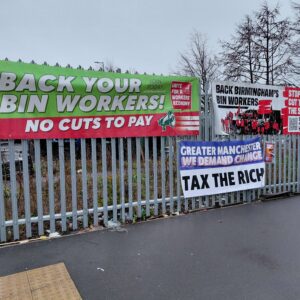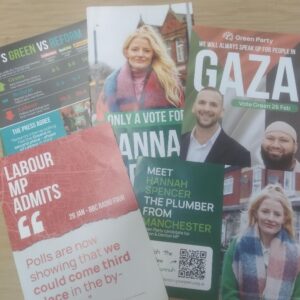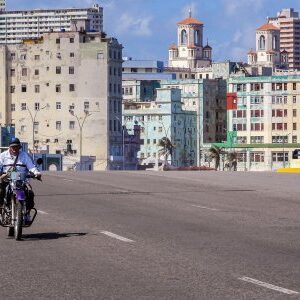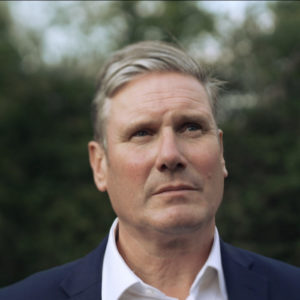Source >> RS21
This year the 4th International youth camp was held in Vieure, central France, from 23-29 July. 200 youth from across Europe came together to better understand how their own political landscapes are situated within the context of globalised capitalism and, likewise, in the context of international solidarity. The camp itself was self-organised around an understanding of anti-capitalist, anti-racist, feminist and LGBTI+ liberatory values, and everyone participated in the maintenance of the camp by sharing security, bar, cleaning, translation and ‘awareness’ team (for dealing with conflicts and concerns) shifts, allowing us to have a taste actually living-out our values and ideas.
The first FI youth camp was held in 1984, making this the 38th camp (accounting for a two-year gap over Covid). It holds the idea that young people should be given the space to test and develop their ideas together, emphasising that youth education in politics should not be based on receiving lectures by old men. Likewise, it doesn’t expect all groups and individuals participating in the camp to hold the exact same politics – it sees a commitment to international solidarity, non-Stalinism and non-reformism as sufficient common ground to build for healthy discussions. I found this to work well, as strategic discussions tended to focus on actual struggles rather than party building or petitioning our respective liberal/conservative states, allowing us to share ideas on how to build on-the-ground momentum and actively engage in solidarity work. Likewise, I found it helpful to hear from experiences of different groups across the camp, some of whom were from small organisations with no party affiliations and others were youth wings of far left political parties or far left party blocks.
Participants were primarily from France, Denmark, Spain, Belgium, Switzerland, Portugal and Scotland, as well as some comrades from South American countries who were able to provide key perspectives and experiences from beyond Europe. International solidarity was not simply a form of tokenistic rhetoric. This was nicely exemplified by the organisation of the camp itself, where participation fees were scaled according to the buying power of each country. Want to buy some beer? Then you’ll have to go to the bank to exchange your euros for ‘tou-cramer’ (burn everything!) with a similarly scaled exchange rate.
Programme
The programme was centred on a different theme per day, these themes having been elected on by a meeting of delegates in Amsterdam during Easter. This is nicely indicative of the way in which the camp is developed mainly by the participants themselves, both before and during the camp, in a way that consciously aims for openness and internal democracy. These themes were selected as key sites of struggle in the present moment, as we face up to a system of ecocidal global capitalism that has led rise to the most recent onslaught of floods, fires, droughts across the world as well as spiralling cost-of-living crises. Likewise, the present growth of reactionary policies and movements has emphasised how questions of anti-racism, feminism and LGBTI+ liberation must also be placed centrally in the revolutionary movements, in acknowledgment of the central role they play in capitalism’s reproduction and social-reproduction.
Each day began with a session known as an ‘educational’, delivering an in-depth analysis of how each of these themes – eco-socialism, anti-racism, feminism, LGBTI+ liberation, social movements, and party and strategy – is situated within the contemporary landscape. The educationals showed how the Marxist method of analysis could be applied to each topic, foregrounding the question of how ruling classes materially benefit from perpetuating a system that is racist, ecocidal, etc. The camp participants ranged from the ages of 15 to 30 and therefore they encompassed a wide range of experiences and prior exposure to this method of analysis. Considering this, it was useful to keep returning to this material analysis, ensuring that all camp participants were developing their critiques on the shared understanding that, for example, racism is not simply a moral position but that it serves as a useful tool for the benefit of capitalist ruling classes. LGBTI+ oppression was therefore analysed through the framework of the hetero-patriarchal family, using social reproduction theory. It was shown how LGBTI+ identities pose a challenge to the way capitalism has organised the labour force in the public and private spheres, exemplifying how matters of our supposed ‘private life’ and of identities are not divisible from the economic system we live under.
The camp recognised that people have had different experiences regarding how capitalism has intersected with their identities. A key part of the camp organisation was to privilege several ‘closed’ spaces, whereby people who had experiences of (1) being racialised, (2) being LGBTI+, (3) womanhood (from a trans-inclusive perspective) and (4) being transgender, were timetabled discussion periods in spaces reserved only for those who identified as belonging to that group. This gave them the opportunity to focus on strategic questions, for example how to organise as racialised minorities in our organisations, or organising the fightback against transphobia, ensuring that liberatory struggles could be developed and spearheaded by those who are most affected. The educational on anti-racism emphasised that the FI camps had had women’s and LGBTI+ closed spaces since the 1980s and 90s, and this had not extended this to a racialised peoples until 2017. The camp acknowledged that it had not always recognised the significance of race in revolutionary struggle, and the delegations have never been a good representation of the racial diversity of the countries they supposedly represent.
Unfortunately there was no session timetabled for feedbacking any key ideas developed in the closed spaces, so I do not know what strategic insights came about within most of the closed spaces. In the women’s space, however, participants were keen to hear about the histories of sexual violence within the SWP. Links were drawn to other far-left organisations who have also faced the same problems, and questions emerged surrounding the accountability of organisational structures that have consolidated unhealthy and patriarchal power systems within themselves despite having well-formed critiques when looking outwards.
The themes of accountability and internal democracy emerged in a variety of discussions over the week, somewhat in continuation of these questions surrounding the internal organisation of left groups and the concurrent intersection with identity-based oppression. It seemed that the youth wings of political groups/parties were keen to foreground accountability procedures as a way of fighting against oppressive systems that have marred their groups in the past. It was recognised as worthy of serious consideration and as necessary of consideration as external struggles, something that is not traditionally foregrounded in left wing strategic discussions. The importance of this is painfully clear though from experiences that each delegation brought to the camp. For example, the Swiss party Solidarité recently experienced an elected cohort of older men who broke away and stole significant finances from the Solidarité, following disputes about their refusal to maintain accountable to the party.
Workshops
Another key part of the camp programme were daily workshops and inter-delegation meetings. Workshops were led by youth participants from each delegation, who would introduce a prominent issue from their national context (strikes, social movements, policy changes etc) and then open this up to the rest of the group for discussion and comparison with correlate issues from their own contexts. Topics included fights against Airbnb; union struggles; resisting Denmark’s deeply racist ‘ghetto-isation’ laws; Frontex and fortress Europe; undocumented migrants and refugee struggles; LGBTI+ struggle; French resistance against pension reform; Switzerland’s compulsory conscription, amongst many others. There were also practical workshops on how to build a tripod, feminist self-defence and building defensive frontlines against security services.
The Scottish delegation led the workshop on the transphobic movement in Britain. Other delegations reported back how useful they had found this workshop, as Britain’s transphobic reactionary movements are further along than the many transphobic movements elsewhere, meaning that key strategic lessons could be developed out of hearing about our experience.
Members of the French delegation delivered a workshop on Soulevement de la Terre and the fight against mega-basins. It gave an overview of why the mega-basins were selected as a target, given that they appear to be less harmful than major fossil fuel infrastructure that is typically targeted by climate groups across Europe. It progressed onto discussing the movement’s strategies and the subsequent police repression. It was clear that mega-basins are both ecologically damaging and part of an extractivist agribusiness economy, making them deeply unpopular with the 95% of local farmers who are outside of the agribusiness economy. This shared opposition allowed a strong alliance to form between the local farmers union and the climate movement, building a resistance movement that numbered 30,000 people. It led to conversations about how these lessons of mobilisation could be applied to our own climate movements and fed into a conversation about the fight in Denmark against the building of a new island near Copenhagen, an unjustifiable vanity project that is going to have major impacts on flooding in the future and yet has no public opposition to currently tap into.
Swiss delegates led a workshop questioning the significance of political parties in developing a revolutionary horizon. The workshop was attended by people from a broad range of views and organisational experiences, from those acting in autonomous groups to members of revolutionary parties sitting within parliamentary left-wing blocks. The participants were keen to discuss the value of parliamentary politics within a bourgeois state, debating if the state’s formal power can be vied for or if it inevitably leads to the co-optation of far-left politics once the parties have been absorbed into the political system. This theme re-emerges over and over again – both in and out the camp- and was reiterated by the splits recently experienced by several of the parties/organisations present at the camp.
Interdelegation meetings
Interdelegation meetings were an opportunity to meet with another national grouping to learn more about their context, and to draw comparisons or points of disagreement. Other delegations were keen to hear about the current state of the Scottish Independence movement, as well as about the UK climate movement, the parliamentary left and an assessment of the strength of a far-right movement. The rise of the far-right was a theme that emerged across many inter-delegation meetings, giving a visceral impression of the growing threat they are currently posing across Europe.
I came away with a greater sense of how comparable many of the struggles are and it felt good to be faced with the reminder of how our respective states are acting on similar interests in the protection of capital – meaning that providing space for discussions like these can be invaluable for comparing our experiences of fighting back and sharing strategies. In practice, the workshops actually provided a better platform for comparing tactics, as in the workshops the conversations remained focused on a single struggle and therefore allowed more time for them to be fully explored. The inter-delegation meetings were only an hour long, meaning that they were typically more of a Q&A session where individuals from each delegation would ask about areas they were interested in. Few of us knew much about the political landscape of the other countries, so the inter-delegation meetings were a good opportunity to ask someone with similar politics for their perspective on their country’s political situation and the role/strength of organised struggles. It felt important to learn these things, but meant that the inter-delegation meetings’ supposed aim was not necessarily achieved – maybe if the camp was two weeks long rather than one!
Conclusions
In all, the camp was an impressive experience where many ideas were shared, critiqued and developed. Moreover, it was a valuable space where we had the opportunity to live beside one another, sharing our experiences of struggle, resistances, strategies, and to socialise and build friendships across borders. It gave us a taste of what it is like to live with a sense of consciousness – both political and interpersonal consciousness – as we participated in, maintained and led the camp’s programme and logistics, and worked within the camp’s internal democracy to make continuous improvements. The result was festive and liberating which stands in stark contrast to the way neoliberalism infects our normal environments. It really did allow us to live out a form of ‘revolutionary tenderness’, in the words of a previous attendee.
Art (55) Book Review (127) Books (114) Capitalism (68) China (81) Climate Emergency (99) Conservative Government (90) Conservative Party (45) COVID-19 (46) EcoSocialism (60) Elections (83) Europe (46) Fascism (64) Film (48) Film Review (69) France (72) Gaza (63) Imperialism (101) Israel (130) Italy (46) Keir Starmer (57) Labour Party (116) Long Read (42) Marxism (49) Marxist Theory (47) Palestine (186) pandemic (78) Protest (154) Russia (343) Solidarity (153) Statement (50) Trade Unionism (144) Ukraine (351) United States of America (140) War (371)
The Anti*Capitalist Resistance Editorial Board may not always agree with all of the content we repost but feel it is important to give left voices a platform and develop a space for comradely debate and disagreement.
Latest Articles
- Birmingham refuse strike: Bin the Injunction!At the court hearing on Friday 13 February, no-one from Unite turned up to oppose the Birmingham City’s application for an injunction to ban mass picketing at its waste disposal sites for six months. That task was left to pro-bin worker activists reports Bob Whitehead.
- Theses for an eco‑socialist critique of Artificial IntelligenceThe Labour government is opening its arms wide to Artificial Intelligence, well known eco-socialist writer Daniel Tanuro outlines here some theses to help eco-socialists respond and resist
- Fighting Reform and LabourBrian Standish reports from the Gorton and Denton by-election
- Trump – Hands off CubaAna C. Carvalhaes, Israel Dutra, João Machado and Manuel Rodríguez Banchs, members of Executive Bureau of the Fourth International, call for support of Cuba
- Roots of the Labour CrisisThe Starmer Project is crashing, explains Phil Hearse.






